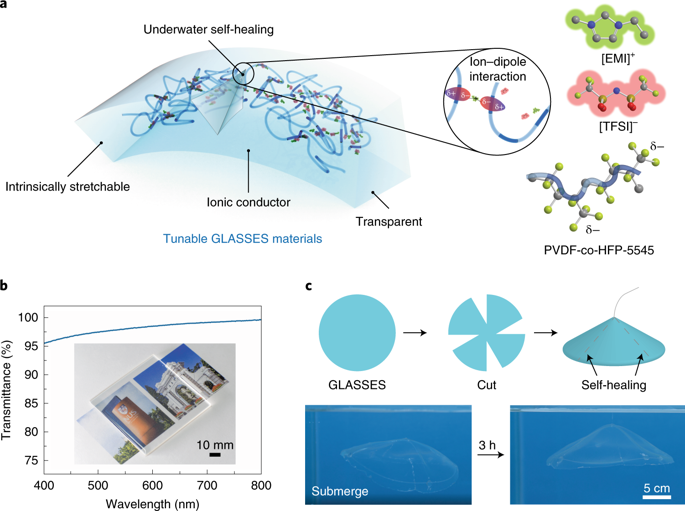Nature Electronics ( IF 33.7 ) Pub Date : 2019-02-15 , DOI: 10.1038/s41928-019-0206-5 Yue Cao , Yu Jun Tan , Si Li , Wang Wei Lee , Hongchen Guo , Yongqing Cai , Chao Wang , Benjamin C.-K. Tee

|
Gelatinous underwater invertebrates such as jellyfish have organs that are transparent, stretchable, touch-sensitive and self-healing, which allow the creatures to navigate, camouflage themselves and, indeed, survive in aquatic environments. Artificial skins that emulate such functionality could be used to develop applications such as aquatic soft robots and water-resistant human–machine interfaces. Here we report a bio-inspired skin-like material that is transparent, electrically conductive and can autonomously self-heal in both dry and wet conditions. The material, which is composed of a fluorocarbon elastomer and a fluorine-rich ionic liquid, has an ionic conductivity that can be tuned to as high as 10−3 S cm−1 and can withstand strains as high as 2,000%. Owing to ion–dipole interactions, it offers fast and repeatable electro-mechanical self-healing in wet, acidic and alkali environments. To illustrate the potential applications of the approach, we used our electronic skins to create touch, pressure and strain sensors. We also show that the material can be printed into soft and pliable ionic circuit boards.
中文翻译:

用于水生环境的自修复电子皮肤
胶状水下无脊椎动物(例如水母)具有透明,可拉伸,触敏和自我修复的器官,使这些生物能够导航,伪装自己,甚至可以在水生环境中生存。模拟这种功能的人造皮肤可用于开发应用程序,例如水上软机器人和防水人机界面。在这里,我们报告了一种由生物启发的皮肤状材料,该材料是透明的,导电的,并且在干燥和潮湿条件下都可以自愈。的材料,它是由氟烃弹性体和富含氟的离子液体的,具有可调谐到高达10的离子电导率-3 小号厘米- 1并能承受高达2,000%的压力。由于离子-偶极相互作用,它在潮湿,酸性和碱性环境中提供了快速且可重复的机电自修复。为了说明该方法的潜在应用,我们使用了电子皮肤来创建触摸,压力和应变传感器。我们还表明,该材料可以印刷到柔软而柔软的离子电路板上。































 京公网安备 11010802027423号
京公网安备 11010802027423号